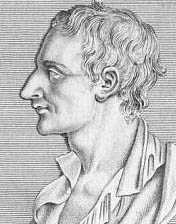Sylvain Maréchal

| French literature |
|---|
| by category |
| French literary history |
| French writers |
|
| Portals |
|
Sylvain Maréchal (15 August 1750, Paris – 18 January 1803, Montrouge, Hauts-de-Seine) was a French essayist, poet, philosopher, and, as a political theorist, precursor of utopian socialism and communism (his views on a Golden age society are occasionally described also as utopian anarchism). Maréchal was also the editor of the newspaper Révolutions de Paris.
Early life
Born in Paris as the son of a wine merchant, he studied jurisprudence and became a lawyer in the capital. At the age of 20, he published Bergeries, a collection of idylls, successful enough to ensure his employment at the Collège Mazirin as an aide-librarian.
Maréchal was an admirer of Jean-Jacques Rousseau, Voltaire, Claude Adrien Helvétius, and Denis Diderot, and associated with deist and atheist authors.
Vision
He soon developed his own project of an agrarian socialism where all goods would be shared. In Fragments d'un poème moral sur Dieu ("Fragments of a Moral Poem on God"), he aimed to replace elements of practiced religion with a cult of Virtue and faith with Reason (see Cult of Reason).
His critique of both religion and political absolutism (Livre échappé du déluge - "Book Salvaged from the Flood", a parody of the Bible) and his atheism caused him to lose his position at the College; Maréchal was forced to live off his literary output. In 1788, he was sentenced to four months in prison for publishing the Almanach des Honnêtes Gens ("Honest Man's Almanac"). The months were given names numbers one through twelve (for example, March is the first month, listed as "mars ou princeps", while February is "février ou duodécembre". The calendar also replaced the usual figures of a calendars of saints with famous characters (such as Blaise Pascal). (Later editions of the Almanach used the French Republican Calendar.) From this moment on until his death, he published anonymously, to prevent further prosecutions.
Revolution
An enthusiastic supporter of the French Revolution, Maréchal also advocated the defense of the poor. He did not become involved in the conflict opposing Girondists and Jacobins, and became instead worried about the outcome of revolutionary events, especially after the Thermidorian Reaction and the establishment of the French Directory. The encounter between him and François-Noël Babeuf (Gracchus Babeuf) and involvement in the latter's conspiracy was to find in Maréchal an early influence on utopian socialism, as evidenced by the manifesto he wrote in support of Babeuf's goals - Manifeste des Egaux (first issued in 1796).
His later works include an 1801 Projet de loi portant défense d'apprendre à lire aux femmes ("Law Project Preventing the Teaching of Reading Skills to Women"), which showed the limitations of his egalitarianism, as well as a Dictionnaire des Athées anciens et modernes ("Dictionary of Ancient and Modern Atheists").
See also
Society of the Friends of Truth
Works
- Bergeries (1770)
- Chansons anacréontiques (1770)
- Essais de poésies légères suivis d'un songe (1775)
- Fragments d'un poème moral sur Dieu (1780)
- Dieu et les prêtres
- Fragments d'un poème philosophique (1781)
- L'Âge d'Or (1782)
- Livre échappé du déluge (1784)
- Almanach des Honnêtes Gens (1788)
- Apologues modernes, à l'usage d'un dauphin (1788)
- Dame Nature à la barre de l'Assemblée nationale (1791)
- Jugement dernier des rois (théâtre, 1793)
- Manifeste des Égaux (1801)
- Pensées libres sur les prêtres (1798)
- Le Lucrèce Français (1798)
- Culte et lois d'une société d'hommes sans Dieu (1798)
- Les Voyages de Pythagore (1799)
- Dictionnaire des Athées anciens et modernes (1800)
- Pour et contre la Bible (1801).
- Costumes civils de tous les peuples connus (1788)
|